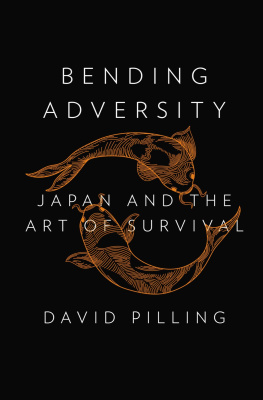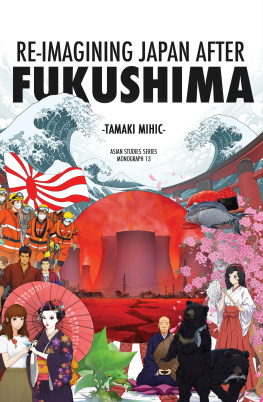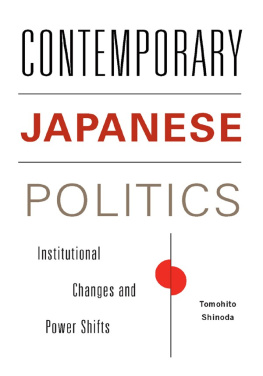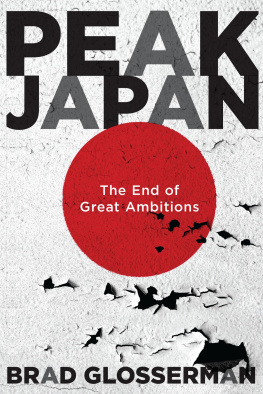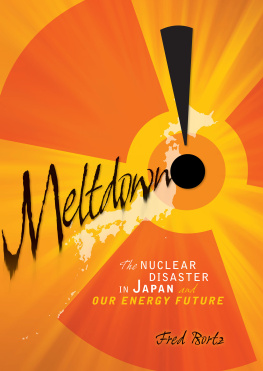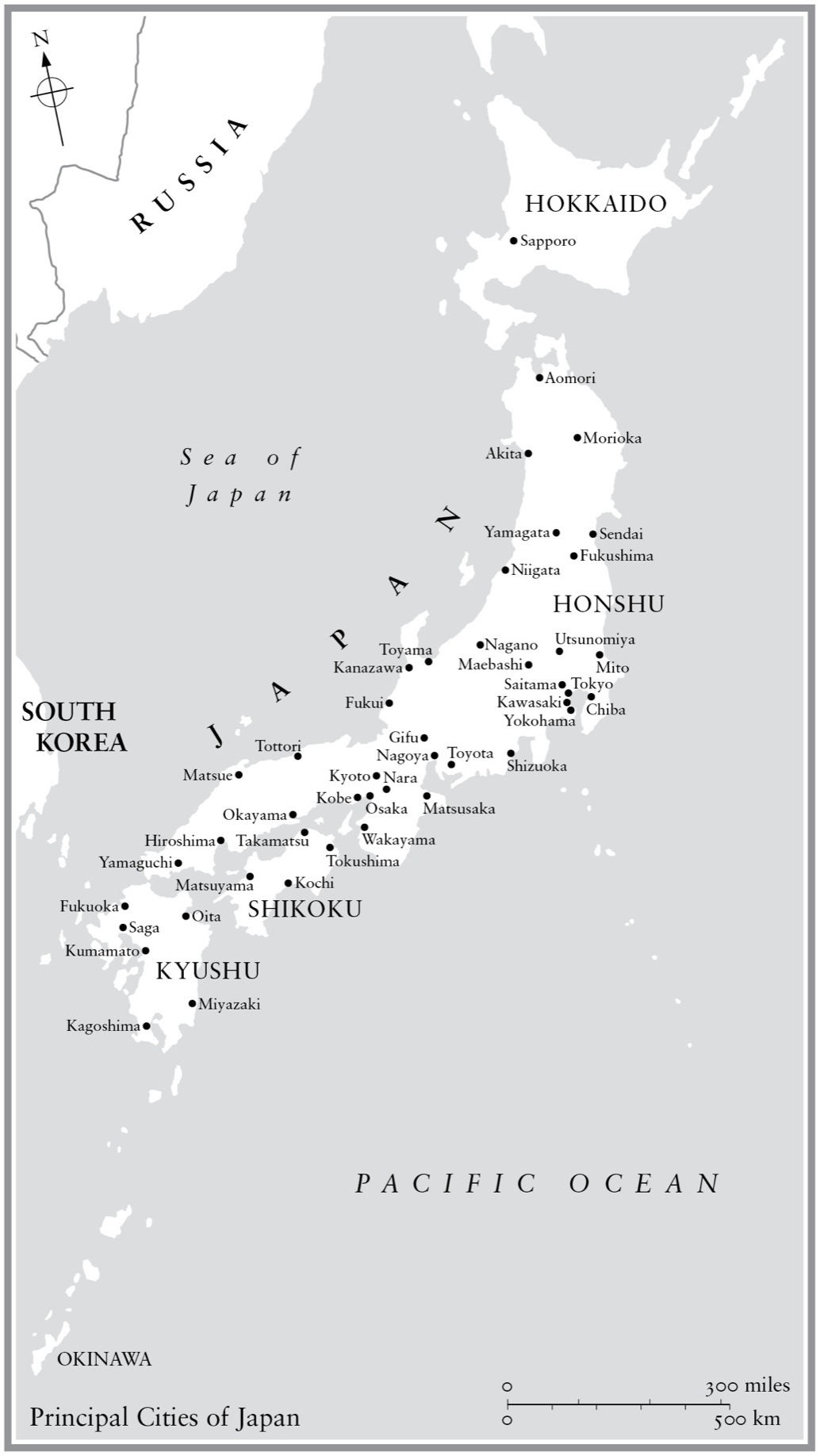List of Illustrations
One of Commodore Perrys Black Ships (copyright Denver Post/Getty Images)
Yukichi Fukuzawa (18351901) (copyright Keio University)
Citizens of Edo take their revenge on Onamazu
The tsunami sweeping into the northeast coast of Japan (copyright Reuters)
Ofunato after the tsunami (copyright Toshiki Senoue)
Members of the Self Defence Forces, 2011 (copyright Toshiki Senoue)
Hiromi Shimodate and Yasuko Kimura, Ofunato (copyright Toshiki Senoue)
Hiromi Shimodate and Yasuko Kimura re-establish Hys caf (copyright Toshiki Senoue)
Seizaburo Sato amid the wreckage of his home (copyright Toshiki Senoue)
The author at Capital Hotel, Rikuzentakata (copyright Toshiki Senoue)
Ippon matsu: Rikuzentakatas solitary surviving pine (copyright Toshiki Senoue)
Tokyo after the massive fire bombing of 1945 (copyright Time & Life Pictures/Getty Images)
Still from Tokyo Story (copyright 1953/2011 Shochiku Co., Ltd)
Chewing gum and chocolates, Yokuska, 1959 (copyright Shomei Tomatsu, c/o Tepper Takayama Fine Arts)
Author Haruki Murakami (copyright Per Folkver)
Cherry blossom against a castle wall in Kumamoto (copyright Ingrid Aaroe)
Tofu hotpot in Kyoto (copyright Ingrid Aaroe)
Foot onsen at a railway station in Kyushu (copyright Ingrid Aaroe)
Ginza at night (copyright Ken Straiton/Corbis Images)
Junichiro Koizumi campaigning, 2005 (copyright Noboru Hashimoto/Corbis Images)
Junichiro Koizumi visiting Graceland with George W. Bush (copyright Christopher Morris/VII/Corbis Images)
A 21-year-old hostess (copyright Shiho Fukada/Pulitzer Cntr/Panos)
Author Natsuo Kirino (copyright Getty Images)
Artist Yayoi Kusama in her New York studio (copyright Yayoi Kusama)
Noriaki Imai (copyright Reuters)
Members of Japans Self Defence Forces at the Sapporo Ice Festival (copyright Reuters)
Anti-Japan protestors in Wuhan, Hubei province (copyright Reuters)
Testing for radiation after the Fukushima explosion (copyright Reuters)
Shinzo Abe waves from a tank, 2013 (copyright AFP/Getty Images)
List of Maps
Japan and its Neighbours
Principal Cities of Japan
Northeast Honshu
We are lost and we dont know which way we should go. But this is a very natural thing, a very healthy thing.
Haruki Murakami,
Tokyo, January 2003
Foreword
All books come from somewhere. This one was swept into existence by a giant wave. For me, the catalyst for writing about Japan was the earthquake and tsunami of March 2011. I had lived in Japan as a foreign correspondent from 2001 to 2008, and had often thought about writing a book back then. But the daily pressures of news reporting and my own lack of urgency ensured that the idea of a book remained just that an idea. I left Japan at the end of 2008 and went on to other things. When the earthquake struck on 11 March 2011, I flew to Japan to cover the disaster both in the immediate aftermath and over the ensuing months. The scale and horror of the catastrophe, and the way the Japanese sought to confront it, provided impetus for an idea that had lain dormant in my mind for several years. My aim was to create a portrait of a stubbornly resistant nation with a history of overcoming successive waves of adversity from would-be Mongolian invasions to repeated natural disasters. The portrait would be rooted in my own seven years experience of reporting and living in the country during a time of economic slowdown and loss of national confidence, but one told, as far as possible, through the voices of Japanese people themselves. It would largely be a portrait of contemporary Japan, a country that, in spite of its obvious difficulties, is changing and adapting in ways that are often invisible to the outside world. But it would also be a depiction rooted in its historical context, since events in the present are rarely fully comprehensible without reference to the past. That is certainly true of Japan, where history and tradition are ubiquitous, peeping from behind the endless concrete of what can seem one of the most relentlessly modern urban landscapes on earth.
The disaster revealed, too, if only for an instant, Japans continuing relevance to the world. Even most Japanese were unaware that the northeast of their country, where the tsunami hit, produced anything other than rice, fish and sake. Though hardly Japans industrial heartland, the northeastern Tohoku region turned out to be a vital link in the global supply chain. One factory alone produced 40 per cent of the worlds micro-controllers, the little brains that run power steering in cars and the images on flat-screen televisions. After the tsunami destroyed the plant that makes them, halfway round the world in Louisiana, General Motors was forced to suspend vehicle production. Likewise, because of electricity shortages after the Fukushima nuclear crisis, Japan already the worlds biggest importer of liquefied natural gas stepped up its purchases of LNG, oil and subsequently coal, becoming an important swing factor in global energy demand.
What the Japanese call Japan bashing stems partly from the countrys continued importance to the global economy. No one bothers much to bash Switzerland, which also grew at approximately 1 per cent a year in the 1990s, thus suffering, by the Japanese yardstick, its own lost decade. But Switzerland, though an important financial centre, is a smallish economy. Japan has shrunk in relative terms, but still accounts for 8 per cent of global output against 3.4 per cent for Britain and 20 per cent for the US. Japan is the worlds biggest creditor nation, not its biggest debtor as is sometimes supposed. It has the second highest foreign exchange reserves and by 2012 was again vying with China to be the biggest holder of US debt. The tsunami briefly reminded people of these neglected facts. It was ironic that, just when Japan was truly in the midst of crisis, some people should be reminded of how important it still was.

